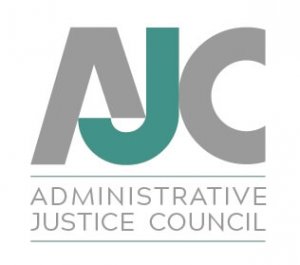The Administrative Justice Council (AJC) is the successor body to the Administrative Justice Forum which was abolished in 2017.
The Council is the only body with oversight of the whole of the administrative justice system in the UK, advising government, including the devolved governments, and the judiciary on the development of that system. The AJC will assume and build upon the role of the Administrative Justice Forum. It will have the following aims:
- to keep the operation of the administrative justice system under review
- to consider how to make the administrative justice system more accessible, fair and efficient;
- to advise the Lord Chancellor, other relevant ministers and the judiciary on the development of the administrative justice system;
- to share learning and areas of good practice across the UK;
- to provide a forum for the exchange of information between Government, the judiciary, and those working with users of the administrative justice system;
- to identify areas of the administrative justice system that would benefit from research; and
- to make proposals for reform.
Purpose
The AJC’s purpose will be to help make the administrative justice system increasingly accessible, fair and effective by:
- playing a pivotal role in the development and sharing of good practice;
- promoting understanding, learning and continuous improvement; and
- ensuring that the needs of users are central.
The Council is chaired by the Senior President of Tribunals, Sir Keith Lindblom. Membership of the Council includes senior representatives from members of the judiciary, civil servants concerned with administrative justice, public service ombudsman and other public sector complaint handling bodies, non-governmental organisations or groups representing ‘users’ of administrative justice and academics and other experts in the field of administrative justice, including those from, and working with, devolved administrations.
A ‘Steering Group’ of core members oversees and guides the work of the Council. It is also advised by an Academic Panel, Pro Bono Panel and Advice Sector Panel. JUSTICE provides the AJC with an independent, non-partisan and dedicated secretariat function. It also acts as a liaison between ministers, civil servants and the AJC. The Council is funded by the Ministry of Justice and charitable sources.
AJC Council and Panel Members are currently engaged in a number of working groups, including a joint JUSTICE/AJC Reforming Benefits Decision-Making Working Party, a Tribunals and Ombudsman Familiarisation working group and a Polluter Pays initiative. A series of webinars was hosted over the summer of 2020, where subjects included Human Rights and Administrative Justice and Digitisation and the Impact of COVID-19 on Tribunals. Looking forward, anticipated projects include a research project into NHS health hubs, a webinar on Ombudsman reform and further work related to the Windrush compensation scheme following our September webinar on the same subject.
Follow the AJC on Twitter for all the latest news and updates.
“The Administrative Justice Council is invaluable, having oversight of the whole administrative justice system. It brings together a range of experts who work together to identify areas where the system can be more coherent and to ensure it is accessible, fair and efficient for all its users.”
Sir Keith Lindblom, Chair

